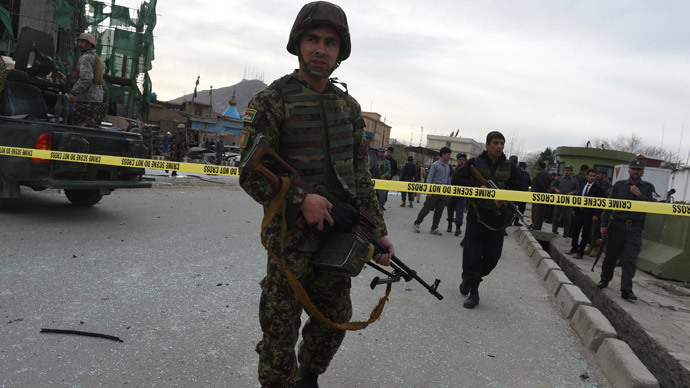UN probe reportedly finds corruption in Afghan police oversight division

A UN sponsored report has stated that Afghanistan government officials in charge of oversight of local police covered up complaints of corruption against law enforcement and has urged their dismissal, according to a copy of the paper seen by Reuters.
The United Nations Development Program (UNDP) is reportedly
investigating why its own division, the Law and Order Trust Fund
of Afghanistan (LOTFA), which commissioned the report, failed to
show it to senior UN officials after it was submitted in January.
UNDP did not say why the submission was delayed.
Since 2002 LOTFA, established in 2002, to "enable the
international community to mobilize resources to strengthen the
country’s law enforcement," has received around $3.6 billion
from international donors to pay Afghan police force salaries and
other expenses. It pays the salaries of about 145,000 Afghan
National Police (ANP) personnel and over 5,500 uniformed
personnel of the Central Prisons Department (CPD). The Electronic
Payroll System (EPS) covers 95 percent of the police force, and
91 percent of CPD guards, while the so-called Electronic Fund
Transfer (EFT) covers 80 percent of salaries for ANP and 94
percent of CPD officers, according to the UNDP website.
READ MORE: US classifies details of financial aid to Afghanistan
LOTFA commissioned the troubling report to find out why the main
system for filing complaints about police misconduct, a 24-hour
phone line, rarely led to prosecutions in Afghanistan. It found
that only nine out of over 2,000 complaints referred to the
inspector general’s office in the country's interior ministry
over a year were actually forwarded for prosecution, according to
the document cited by Reuters. It means the chief of the agency,
Hakim Nejrabi, along with his senior personnel, ignored an
avalanche of complaints or else simply blocked them.
"Systemic corruption is endemic to the organization because
the leadership has not only tolerated corruption, they have
facilitated it and, in many instances, participated in it,"
the report concluded, recommending the sacking of Nejrabi.
The senior Afghani official has dismissed the allegations made
against him in the report, dubbing them "a political
character assassination." He claimed that over 50 interior
ministry officials had been investigated since he took office
over a year ago, and a total of 22 cases had been forwarded for
prosecution.
The UNDP said it only learned of the report after Reuters asked
about it in April and is currently busy reviewing its internal
processes "to improve efficiency, oversight and
accountability to prevent this from happening again." It
also added that a copy was then forwarded to Afghanistan’s
anti-corruption watchdog, the Independent Joint Monitoring and
Evaluation Committee (MEC).
Last year, the US special inspector general for Afghanistan reconstruction slammed LOTFA for allegedly losing track of millions of dollars in payments to some ghost employees. Yama Torabi told Reuters the report "shows that for years they've done nothing to solve the problem - not LOTFA, the Afghan government, or previous ministers."
Meanwhile, a report in January by the Special
Inspector General for Afghanistan Reconstruction (SIGAR) found
that the two main electronic systems used for payroll data in
Afghanistan are awash with flaws and cannot even communicate with
each other.
"The ANP’s process for collecting attendance data, which
forms the basis of all ANP personnel and payroll data, has weak
controls and limited oversight," the report released on January 30 stated.
It noted that neither CSTC-A (The Combined Security Transition
Command) nor UNDP officials are present to oversee the data
collection, and reported "limited knowledge of and influence
over the process."
READ MORE: Afghanistan bleeding US taxpayers, corruption the culprit
On top of this, SIGAR said that a daily sign-in, sign-out system
for recording attendance was reportedly only used by officers and
not enlisted personnel, so there is no documentation that unit
commanders are "accurately reporting subordinate personnel
attendance."
"All these factors could result in personnel being paid for days
not worked, either with or without knowledge of supervisory
personnel," the report concluded.
"Unless the Afghan Interior Ministry (MOI) develops the
capability to ensure and verify the accuracy of ANP personnel and
payroll data, there is a significant risk that a large portion of
the more than $300 million in annual US government funding for
ANP salaries will be wasted or abused," SIGAR warned.











